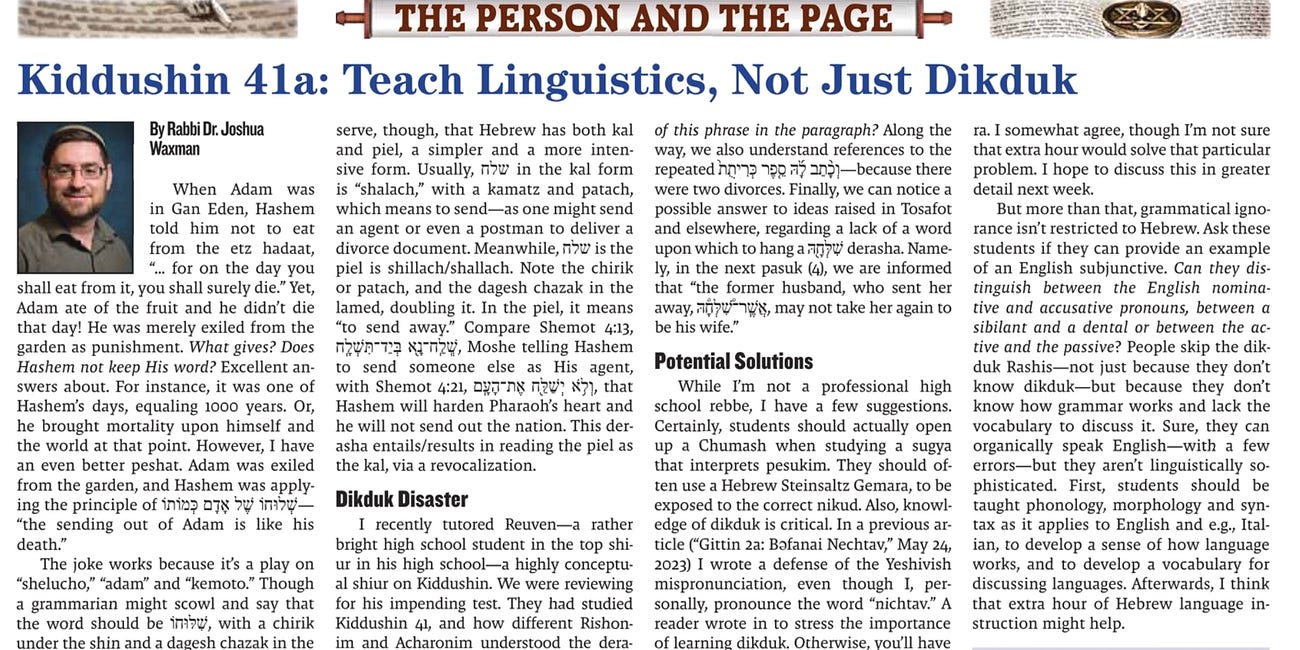Mistranslated Zoos and Grammatical Analyses
I know I’ve already posted about the parsha this week, and twice already on the subject of Eliyahu Munk’s rabbinic translations. Still, I chanced upon the following Chizkuni, on this parsha, so we’ll have a post about it.
Towards the beginning of Az Yashur, Chizkuni writes (with Eliyahu Munk translating):
So, on Ozi vezimrat Kah, Chizkuni, an early supercommentary of Rashi, quotes Rashi and then says something. Eliyahu Munk tells us, in an Editorial insertion, that he is not going to bother translating these comments.
What is good about this?
He knows his own limitations — “neither is this editor”
He knows his audience — not interested in analyzing poetry or in understanding grammatical analyses
He is transparent about this, saying he won’t translate
What is bad about this?
Since the work is in English, readers still don’t know what is being omitted, what percentage, and what bearing it has on the parts that are omitted
Indeed, he is not an expert in classical Hebrew grammar, but he still does translate some grammatical Chizkunis, albeit incorrectly. He does not realize it, nor does the reader.
I, too, am not an expert grammarian, but I might have a greater degree of grammatical knowledge here and there. As I’ve written, we really should be teaching Hebrew grammar, as well as linguistics, to educate ourselves and our children. Otherwise, we will miss out on what in the world Chazal are actually saying.
Teach Linguistics, Not Just Dikduk (article summary)
My article for this past Shabbos in The Jewish Link was about the importance of teaching dikduk, as well as linguistic knowledge more broadly, applied to languages such as English or Italian. Students should know phonology in general so that they have the intuition and capabilities of tackling Hebrew
So here is a Chizkuni from later in the parasha, with a botched translation:
עם זו כל מקום שנאמר בו זו הרי הוא במקום אשר, וכן זו חטאנו, ופי׳ עם אשר גאלת.
עם זו, “this nation;” Whenever the expression זו is used it means the same as אשר, “that one,” or “which;” compare Isaiah 42,24. It follows that in our verse, the words עם זו גאלת, mean: “You have redeemed a nation.”
No.
The point was that zu in Biblical Hebrew is not the same as zo / this. Instead, it is the Hebrew cognate of the Aramaic de, meaning “which”. This in the same way that zahav in Hebrew is dehav in Aramaic. There is a common Yeshivish mispronunciation of zu instead of zo when they mean “this”. When people get married, the groom says “Harei at mekudesh li betaba’at zu”, but that is ungrammatical and he should be saying “betaba’at zo.” So too all over the place in Artscroll gemaras.
Because of the It does NOT mean “that one”, a demonstrative pronoun. It means “that” in the same way it means “which”.
So Munk should not be translating it as “this nation”, nor “that one”. Those are just wrong, and not what Chizkuni is saying.
Chizkuni points as well to Yeshaya 42:24:
מִֽי־נָתַ֨ן (למשוסה) [לִמְשִׁסָּ֧ה] יַעֲקֹ֛ב וְיִשְׂרָאֵ֥ל לְבֹזְזִ֖ים הֲל֣וֹא יְהֹוָ֑ה ז֚וּ חָטָ֣אנוּ ל֔וֹ וְלֹֽא־אָב֤וּ בִדְרָכָיו֙ הָל֔וֹךְ וְלֹ֥א שָׁמְע֖וּ בְּתוֹרָתֽוֹ׃
Who was it gave Jacob over to despoilment
And Israel to plunderers?
Surely, GOD—against whom they sinned,
In whose ways they would not walk,
And whose Teaching they would not obey—
In this case, Hashem zu chatanu lo means Hashem against Whom we have sinned. So it is like a “which”, an asher.
Similarly, am zu ga’alta means “the nation which You have redeemed”.
Take other grammatical translations in these works with a grain of salt.



